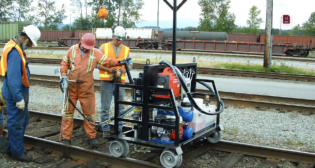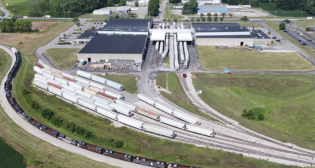
‘A Disconnect From Reality’
Written by Michael S. Baldwin, President, Brotherhood of Railroad Signalmen
As a labor leader, I often give little attention to the political pawns and one-sided opinions of writers that attempt to create a public illusion for the Wall Street puppets running the railroads. However, when opinions like [Railway Age Capitol Hill Contributing Editor Frank N. Wilner’s] attack on the Brotherhood of Railroad Signalmen (BRS) demonstrate ignorance as to the facts and the law, a correction of the record is proper.
The writer/opinion commenter here demonstrates a disconnect from reality and a willingness to carry the water for the railroads involved in national bargaining who are desperate to divert attention from their lack of good faith in bargaining. Rather than acknowledge the stalling tactics of the railroads and unwillingness to make a meaningful wage offer while proposing to diminish industry health and welfare benefits, [Mr. Wilner] decided to interject [himself] into the internal process and Constitutional provisions of this union.
To begin, I am sure the writer should have been aware of the fact that the BRS recently requested a proffer of arbitration and release from mediation; yet, he conveniently omits this important piece of information from the article. At the moment, we await the National Mediation Board’s action on our request for release; if the BRS is released, there is a 30-day cooling-off period before self-help is permitted under the Railway Labor Act (RLA). During that period, the President [of the United States] can determine that a strike or lockout by the carriers would deprive a part of the country of essential transportation services and appoint a Presidential Emergency Board (PEB) to investigate the dispute and make recommendations. In recent decades, as the railroads have consolidated, no President has allowed an unresolved national rail dispute to continue without appointment of a PEB. While PEB recommendations are not binding, if the parties do not reach agreement 30 days after the PEB reports its recommendations, Congress can enact legislation settling the dispute, and it has done so in the past.
Further, under the BRS Constitution, we must provide a strike ballot to each affected member in order to avail ourselves to the option of legal self-help, if it comes to that. Mr. Wilner clearly has forgotten, or more than likely could not care less about what a union’s constitution requires it to do in order to take the steps permitted by the RLA. In chastising the BRS for complying with the processes of its Constitution, [Mr. Wilner] also appears to be ignorant of Supreme Court decisions stating that the threat of self-help and actual self-help are part of the dispute resolution process of the RLA; they are not foreign to the Act, or counter to the Act, but are part of the Act’s tool kit for inducement of settlements.
The article is confused in that it simultaneously describes our compliance with our Constitution as a political stunt because a strike at present would be illegal, but then accuses us of a lack of patriotism during a series of national and international events that have affected the supply chain. Well, which is it then? A stunt, a serious threat, or a legitimate exercise of statutory rights in the face of railroad intransigence? It does not matter to [Mr. Wilner], because the goal is not to engage with the issues in bargaining but to tar BRS at the behest of the railroads. In smearing our hard-working members with charges of disloyalty, Mr. Wilner, who purports to know something about the RLA, either does not know as much as he thinks or is being disingenuous. The scaremongering in the article then has nothing to do with how the Act is structured or actually works in practice but is all about doing the dirty work for the railroads.
[Mr. Wilner] failed to refer to the NCCC’s recent ploy of offering a “pay-day loan” in the hopes to continue to drag negotiations out further and give the appearance of actual efforts to meet the moment in terms of fair compensation for hard-working railroaders, while not actually making a genuine offer to resolve the dispute as a “political stunt.” Further irony spews from the writer when he comments about supply chain issues. Conveniently, the article neglects to make mention of the compounding effect the Class I’s ruthless cost-cutting business model called Precision Scheduled Railroading (PSR) has had on the supply chain. Railroad customers, rail unions and government agencies have recognized that the carriers’ drastic cuts in employment, over-extension of the remaining workforces, and pressure on employees to reduce or cut corners on inspection, maintenance, and repairs have seriously degraded rail service and negatively impacted the supply chain. The writer mentions none of the above in its article. For the sake of brevity, I suggest that you, Mr. Wilner, and your readers watch the Surface Transportation Board’s (STB) hearings conducted last week, during which executives of the Class I’s were forced to squirm in their seats while receiving a long overdue reality and accountability check from shippers, unions, the Departments of Transportation and Agriculture, and from members of the STB.
Members of all the Rail Unions, including the BRS, have sacrificed much over the [past] three years. We have kept this country running through the pandemic by ensuring safe and efficient rail operations, which, in turn, delivered life-saving materials and supplies into the hands of the front-line medical workers and the general public. In particular for BRS members, we have endured the difficult job of maintaining this nation’s complex signal system through the Class I’s continued job cuts and increased job responsibilities. The jobs cuts and pressure to cut corners were done solely to increase railroads’ record high and, now, historic profits; Class I profits have actually increased since the start of the pandemic, not through growth but through cost-cutting.
Today 80% of the pre-pandemic work force is moving and supporting the movement of 97% of pre-pandemic freight while profits are up 9%. Now, when these same essential workers raise their voice and simply ask to be treated fairly and with respect, [Mr. Wilner] has the audacity to call it “saber rattling.” The only unpatriotic act is [his] pandering to the railroad executives while kicking mud at their fellow Americans who seek fair compensation for their hard work and a share of the bounty created by their efforts in recent years, but which the Class I’s have kept to themselves and their investors.
Editor’s Note: Railway Age is pleased and proud to publish Michael Baldwin’s opinion. Open dialogue and frank discussion (no pun intended) are what Railway Age readers have come to expect. It is important to understand that Frank Wilner’s opinion piece is just that—an opinion piece, the views of which are his own. Thus the reason for his name appearing in brackets throughout Baldwin’s article. In fairness to Wilner, it is also important to understand that we have published—and will continue to publish—opinion pieces that take the railroads and their executives to task. Case in point: Wilner’s take on CSX chief executive Jim Foote’s recent STB testimony. There have been numerous other examples by him and other contributors, as well as by me (for example, my rants on euphemistic language and “corporate–speak”). If we cannot disturb people’s sleep from time to time and prompt them to think and respond, we are not doing our job. That’s one reason, in my honest and humble opinion, why Railway Age continues to thrive after nearly 170 years. We love our readers—all of them. And we love this industry—all of it.



